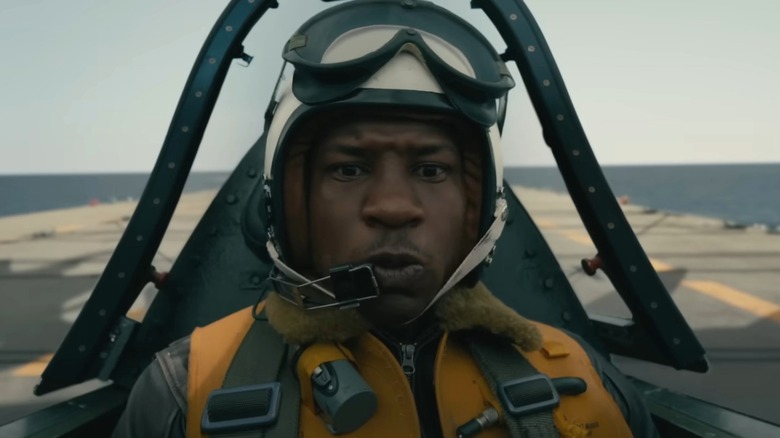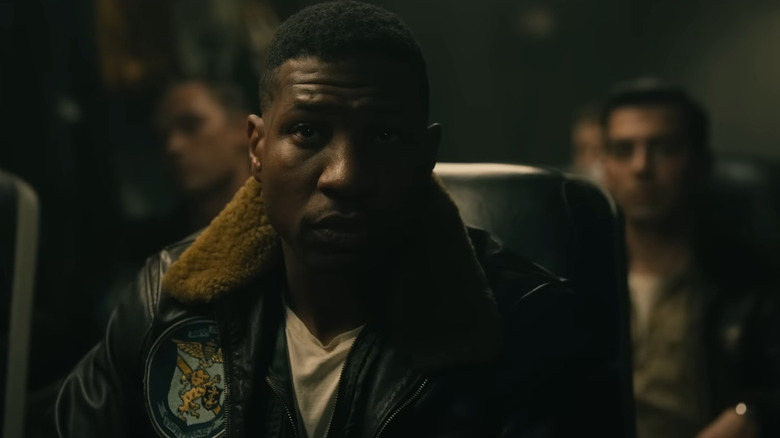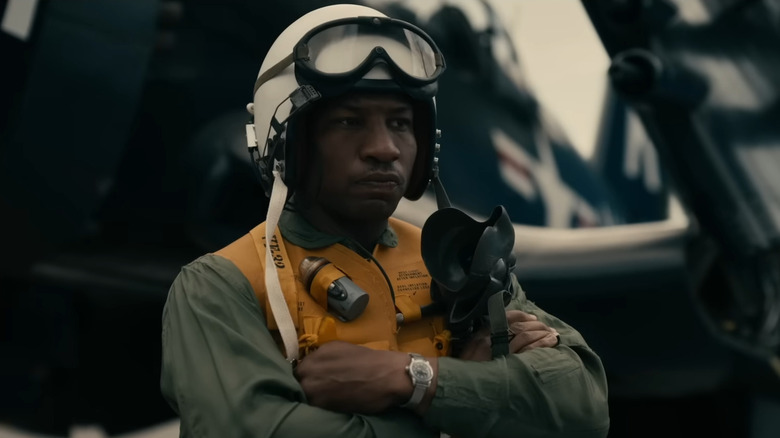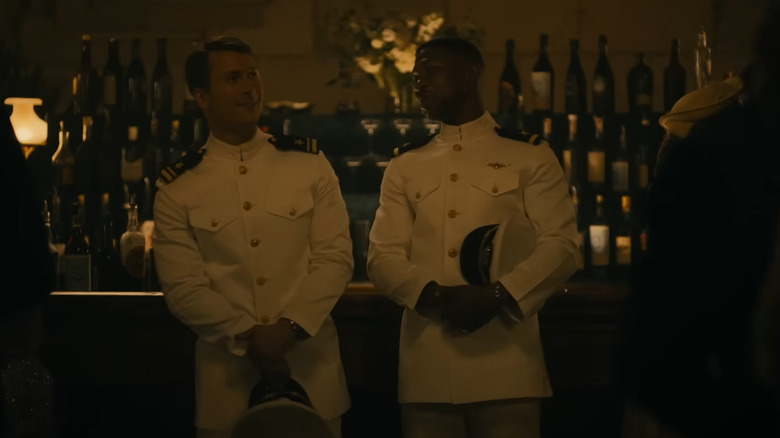Jonathan Majors On The Meaning Of Devotion And Watching Movies In Theaters [Interview]
In the upcoming film "Devotion," directed by J.D. Dillard, we meet Jesse Brown (Jonathan Majors), the first Black man to complete the U.S. Navy's basic flight training program. During the Korean War, he proves himself to be an exceptional pilot, but the main story is about the friendship between Jesse and his wingman, Tom Hudner Jr. (Glen Powell), who ended up as two of the most celebrated pilots from that war. Based on the book "Devotion: An Epic Story of Heroism, Friendship, and Sacrifice" by Adam Makos, the movie about these real-life heroes hits the big screen next week.
I attended the movie's Los Angeles premiere and got a chance to chat with Jonathan Majors on the red carpet for the film (along with a handful of other journalists). He spoke about a lovely comment from the director about his performance, the idea of a story that is true versus one that is saying, "This really happened," wanting to get his pilot license, and why we should all be seeing "Devotion" in theaters. He also gives us his feelings on the word "devotion" and what it means to him.
'You can tell how you want it to be, or you can tell how it is'
Majors' grandfather served in the military, as did Dillard's father, who served as a technical advisor on the film. Dillard has stated that Major's portrayal of Jesse brought his own father to mind. Majors hadn't heard that before. He says:
"I think while being a man of the military or a marshal man or a man of aviation is not a monolith, there is a very clear archetype that is universal. It's a big compliment that he thinks that this portrayal hits that tone. I think I was trying to honor that military bearing that I grew up with, with my grandfathers and my father. I really like his dad, too, so that's kind of cool."
"Devotion" is based on a true story, but Majors points out that "true" and "really happened" are different things:
"We're not telling a lot of true stories, actually. We're telling a lot of, 'This really happened.' I'm not going to s*** on nobody, but it's a job. You can tell a story two ways, essentially. You can tell how you want it to be, or you can tell how it is. The thing you have to understand, or you have to be humble enough to get up under, is that no one knows what's right and what's wrong.
But there is a universal truth, and that takes a certain amount of collaboration, and it's not as comfortable to tell a true story. Real events are real events, but as we know, your interpretation of something and my interpretation of something may be quite different. However, there is a third interpretation or maybe an eighth or ninth interpretation that is a true interpretation that is a wall with multiple doors, not just one."
'Flight is a miracle'
That said, the Korean War is often referred to as the "forgotten war." We see so many films based on the stories of soldiers from WWI, WWII, the Civil War, and the Revolutionary War, but not the fight in Korea. One thing that a lot of the actors and crew told me on the carpet over and over again is that they hope this film will put more of a focus on the heroism of the American troops, whatever anyone thinks of the war itself.
Majors was asked about his desire to get his pilot's license, though Majors jokes, "Well, I've been quite busy." He is, of course, playing the role of Kang (more than one version of him) in the Marvel Cinematic Universe and will next be seen in "Ant-Man and the Wasp: Quantumania." He's also playing the villain in "Creed III." Finding time to get licensed might be a bit difficult. Still, he says:
"It's going great. I did, in meeting Glen and getting up in an airplane, I was like, 'Oh, that's kind of cool.' I would love to fly myself, and my family — safely — places. It would just be fun. It's quite romantic to do that. Flight is a miracle, and it's something we've kind of wrestled down, and so now it's an art form, so I'm into it."
Glen Powell, of course, starred in another aviator film you might have heard of called "Top Gun: Maverick."
'We should normalize devotion'
The title of the film is a powerful thing for Majors. He says it's a word and a feeling we should normalize. As he explains:
"I thought, 'Okay, that's a big word. That's a really big word.' I felt I had an understanding of it, and the understanding I felt was massive. Then doing the film is kind of hand in glove to what I would hope audiences would take away from it. I'm not one to be like, 'Oh, you should really get this. This is important,' but I think there is something that — we should normalize devotion. I think it's such an arcane word that people don't want to use it anymore, but there is a certain frequency of love that becomes devotion.
It's a certain amount of duty, a certain frequency of duty, that becomes devotion, and I think it's something we can apply more to our day-to-day. I think it gives extremely long-lasting results. It gives a legacy to your love. It gives a legacy to your service, a legacy to your art. That's what I got, so I hope someone else can get that, too."
It's a lovely sentiment and something that was echoed all over the carpet from the actors and the crew, as well as some of the real descendants of both Jesse Brown and Tom Hudner Jr. The love and devotion these men had to each other, to their duty, as well as the devotion that Jesse had to his wife, Daisy (played by Christina Jackson), is a huge part of the story.
'Use it to connect you to somebody else, and the more the merrier'
There have been a whole lot of discussions recently, particularly post-pandemic (or at least post-the height of it), about the moviegoing experience and if streaming is the future. Majors has a lot to say about why we should see "Devotion" in a theater. He also spoke about how it's a communal experience, and it allows us to respond to things in a group setting:
"Well, it's communal; theater, cinemas, it's communal, and it lets you know that you're not alone in what it is that you're feeling. That works for the bad and the good. You feel moved by something, the other person feels moved by it as well, and that can make you go, 'Oh yeah, we agree with that! As a species, we agree with that! To love somebody like that, I agree with that. I can see it in your eyes, she can feel it next to you, he can feel it, and the kid over there can feel it'. We go, 'Okay, why don't we do more of that?' You know what I mean? Or we get angry. 'That's not right. I don't like that. You don't like that. As a group, we don't like this anymore.'
"So when we leave the theater, it's no longer — don't be selfish. That's what it is. Let your experience do what it's supposed to do. Use it to connect you to somebody else, and the more the merrier. The more the merrier, the bigger the impact. Let's be aggressive about it."
"Devotion" will hit theaters on November 23, 2022.




